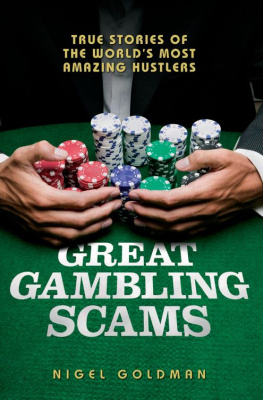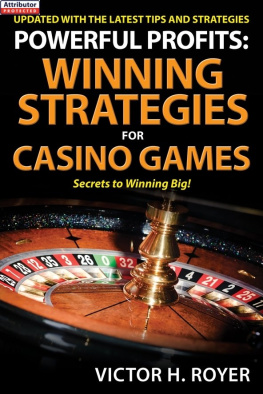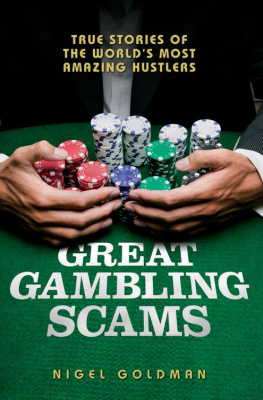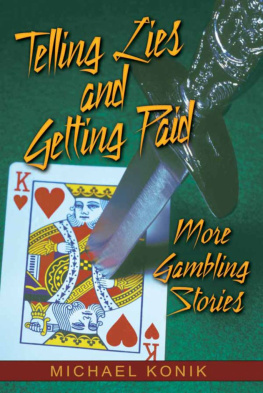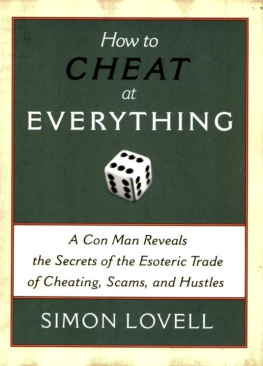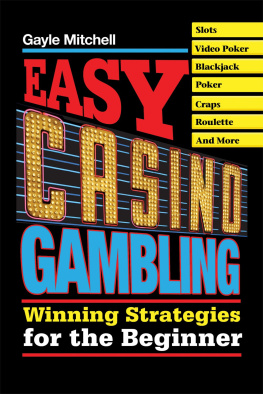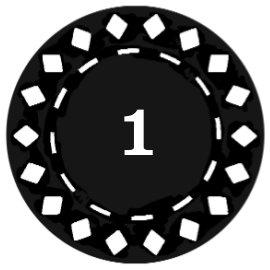G ambling has been around for centuries and has encompassed all walks of life. In the 18th and 19th centuries, the aristocracy famously enjoyed their flutters and some went spectacularly broke trying to beat the odds. More recently, a couple of financial advisors have been jailed after losing millions of pounds of clients money backing outcomes unsuccessfully on the internet. And, while all this is going on, gambling cheats in all walks of life continue to conjure up new formulas to deprive their victims of their hard-earned cash.
The thing that strikes me about gambling is that it is all self-taught. If you want to learn languages, acting, singing, cooking or flower arranging, youll find a plethora of choices of ways to go about it in your local paper, from private tuition to night classes. But gambling? No. You pick it up as you go along. Learn by your mistakes. Which makes cheating at it even more spectacular, because first you have to learn the rules, and then you have to learn how to break them.
In this book there are 13 true stories about some of the more spectacular gambling scams that have occurred all over the world over the past century or so. There is also a comprehensive glossary of gambling terminology at the end.
Enjoy. If you gamble already, it may well change the way you play. And, if you dont, it will put you on your guard before you do.
N ice is magnificently situated on the Baie des Anges, surrounded by the foothills of the Maritime Alps, some 19 miles from the Italian border. It has a splendid old town, separated from the busy new town by the river Paillon. With its sheltered situation and mild climate, Nice is one of the oldest established winter resorts on the Cte dAzur, and is also a very popular summer resort too. The old town of Nice is a maze of narrow streets and lanes, dotted with colourful cafes and restaurants. A flower market is held every day on Cours Saleya. The 17th-century cathedral has rich stucco decoration, fine choir stalls and beautiful wood panelling in the sacristy. This magnificent Baroque building was once the palace of the Counts of Castellar. It has a handsome entrance hall, an 18th-century pharmacy and ceiling paintings in the state apartments. The Jardin Albert 1er runs north-east from the sea front to the busy place Massena, the hub of the citys traffic, which is where the Fountain Du Soleil is situated. And the Casino Municipale.
When Norman Leigh first walked into the Casino Municipale with his father in the 1950s, I doubt he could have imagined the incredible sequence of events that was to be played out in that grand building over the following decade. That first visit to the casino ignited a touchpaper and started a chain of events so incredible that Norman Leigh has gone down in the history books of gambling as a legend, the man who orchestrated an event held as impossible by all expert opinion: breaking the bank at roulette.
This incredible gambling story started after Mr Leigh Sr, on that first visit to the Casino Municipale in Nice accompanied by his son, embarked on a disastrous betting adventure on the French roulette tables that was to see him financially ruined. Mr Leigh had fallen for the oldest trick in the book gambling on the theory that even-chance bets on the outside chances at roulette must eventually come good in ones favour. A very dangerous philosophy. The hapless Mr Leigh threw good money after bad trying to break a sequence of a run on the roulette table. He kept doubling up his wagers, almost in a panic, in large old French Franc casino plaques, in an attempt to try to break the houses run on an even chance coming up time and time again.
Betting systems are as old as the hills and fall into broad categories: betting the same after each decision (known as flat betting); raising wagers after wins (called positive progressions); and raising money after losses (called negative progressions). The negative progression was the system that Mr Leigh employed. Labouchere or Martingale are the correct names for this betting strategy of raising bets after losses, and, while this system can often be profitable in the short term, time and time again one streak of bad luck can completely wipe you out.
The origin of Martingale dates back to the 18th century. It is named after Henry Martingale, an English casino owner who is reputed to have urged losing punters to double em up with their wagers. Martingale is one of the oldest betting systems using a negative progression, and the system is very simple. The player uses a betting series that is twice as large as the preceding one, as with 1, 2, 4, 8, 16, 32, 64 etc. So long as you win a bet, you will continue to bet at the lowest level in other words, a wager of one chip. If you lose a bet, you will move up to the next wager, doubling the amount of the previous wager. Use of this system ensures that, whenever your wager eventually wins, you will win the amount of the original wager, in this instance one chip. However, Martingale is extremely dangerous and risky, because occasionally long runs can occur against you on even-money chances, and by the time you get to your 11th and 12th wager you are up to 1,024 and 2,048 units to try and recoup your original one chip as the unfortunate Mr Leigh found out, to his enormous cost, when he watched in horror as black came up 13 times in a row, while he was betting in ever-increasing sums on red.
Even if he had not wiped himself out financially at that stage, the casino had a trump card up their sleeve. They had a table maximum, which he would have reached on the very next spin anyway, to thwart his attack. A story is told in The Sealed Book of Roulette, which came out in 1924, that Arnold Rothschild once said to M. Blanc, manager of the casino in Monte Carlo, Take off your maximum and I will play against you as long as you like. Rothschild knew that without a maximum bet he could use the Martingale system and eventually beat the house. But this didnt help poor Mr Leigh Sr, who didnt even have the cab fare back to the hotel, let alone the means to get himself and his son back to the UK. Young Norman would never forget the smug look of self-satisfaction on the face of the chubby young casino manager as he stood by the roulette table in his black dinner jacket and bow tie, arms folded, having wiped out the Englishman. It was a look that was to haunt him for years to come.
As if the casino managers smirk wasnt bad enough, Norman then had to suffer the indignity of attending the British Consulate in Nice that very evening and listening to his father tell a pack of lies to the officials there that they had been robbed at knifepoint by French peasants at the roadside, and needed their fare home and some pocket money provided for them. The helplessness, poverty, despair and humiliation remained deeply engraved on Norman Leighs mind and, as soon as they returned to England courtesy of the British Consulate, he dedicated himself to formulating a plan that would enable him to exact his revenge on the Casino Municipale in Nice. He did not care how long it took. Revenge would be sweet, and worth waiting for.
Over the following years, Norman Leigh turned himself into an extraordinary man. Despite having no formal education, he taught himself to speak six or seven languages fluently. He loved taking risks, just like his father hence his interest in gambling. He always dressed smartly, wore a suit with a white shirt, bow tie or cravat, and importantly had an agile mind when it came to mathematics. The size and speed of his fathers loss at the casino in Nice continued to torture his mind, yet he was convinced that there must be a method or system he could devise that would enable him to recover all the money, and more. And so Norman Leigh devoted the bulk of his time in playing around with roulette systems and methods, spending endless hours in casinos and practising on the life-size roulette wheel he had at home. He felt certain in the back of his mind that there must be a method or strategy that could put the house in the same unfortunate position as the punter when a long run or sequence occurred, causing the bank to participate in the role of the player and have

